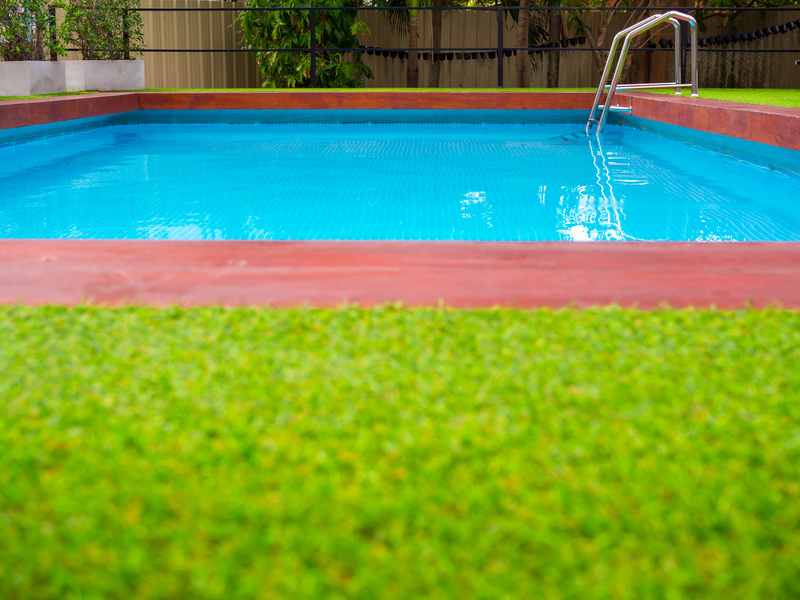
7 Best Swim Snorkels for Better Technique and Faster Swimming
Ready to throw down on a new swimmer’s snorkel? Here are reviews of the best swim snorkels for lap swimming.

Frustrated with cloudy pool water? Here are five reasons it’s happening and proven fixes so that you can get back to enjoying your pool.
In the course of owning and trying to enjoy your pool, it’s almost inevitable that you are going to run into the problem of cloudy pool water.
There are several primary reasons that the pool water has gotten cloudy.
Here are the principal offenders:
For new pool owners, cloudy pool water can be a little intimidating. I get it. There’s lots of lingo and sciencey words involved.
Phosphates. Cyanuric acid. Calcium hardness. Science, science, and more science!
But fear not.
Once you get a clear (see what I did there?) idea of how your pool works and what it needs to function optimally, cloudy pool water will become a thing of the past.
Here’s what you need to know about diagnosing and fixing cloudy pool water.
Everybody knows what chlorine is and what it does for swimming pools, and yet, it’s staggering how often cloudy water can be quickly fixed simply by optimizing the chlorine levels in the water.
When chlorine is low, all the stuff that causes cloudy pool water—algae, bacteria, bodily fluids like oil and sweat—have free reign on the pool.
Next time you have a group of people in your pool, notice how quickly the water quickly gets “foggy”—it’s not just leaves and dead insects that cause this issue.
Sunscreen, oily skin, and sweat “burn up” chlorine.
(So does excessive exposure to sunshine—UV rays degrade chlorine over time.)
How to Fix:
The fix, in this case, is easy enough:
Once this is done, let the pool pump circulate the water and sit back poolside for a few hours.
In the future, load up some chlorine tablets either in your basket skimmer or in a floating chlorine dispenser to ensure that your pool is getting the cleaning it requires.
While we have that pool test kit out, we may as well take a gander at the other key markers of pool water health.
These include:
Testing the water regularly is something you should be doing and will help you catch potential problems like cloudy water in your pool.
The workhorse of your pool cleaning is the pump and filter.
They work up to 12 hours a day, collecting junk from your pool while you are sleeping, doing the grunt work of keeping the water clean.
But when issues arise in the filtration system, the water doesn’t get cleaned properly.
Fortunately, this problem is usually not that complicated to fix.
How to Fix:
Here are the three simple steps to resolving this issue:
If these fixes don’t resolve the cloudy pool water, it might be time for replacing the filter and pump or the filter media.
Swimming pools are a heaping spoonful of fun, but in all that excitement to cannonball into the water swimmers tend to forget that they are tracking in a lot of dirt, grass, mud, and other organic debris into the water.
Add that to the insects, leaves, twigs, and other miscellaneous stuff that falls into the pool, and it doesn’t take long for your pool chemicals to become overwhelmed.
From there, it’s not a long trip to algae growing on the sides and wall of the pool and cloudy water.
How to fix:
When it comes to keeping organic refuse out of the pool, make sure to consistently use a cover for your pool (even a solar pool cover can be helpful).
Finally, we have our last leading cause of cloudy pool water—yucky weather!
Rain can be great in a lot of respects: waters the lawn, gives us a respite from streaks of blindingly hot summer days, and in the right conditions, can be quite refreshing.
But when heavy rainfall hits our swimming pool, it starts to mess with the pool chemistry.
Added water dilutes our pool chemicals, weakening their ability to do its job properly, and rainfall is usually accompanied by falling debris, compounding reason #4 for cloudy pool water.
If you notice that the pool water has turned cloudy after a couple of days of hard rain and windy weather, bust out your trusted test kit and measure the chlorine and pH levels.
This will usually solve the present dilemma, but properly covering the pool when it is not in use will help prevent cloudy pool water from storming back your way again.

Shocking the water—even though it sounds like an immediate task—takes time. While pool shock starts to work quickly, it can take time for free chlorine to do its job properly.
Additionally, if you are shocking the pool using unstabilized chlorine during the daytime, you are degrading and burning off a significant amount of the chlorine.
UV rays break down chlorine, so if you are going to shock the pool to treat cloudy pool water, do so at dusk so that the shock has time and a UV-free environment to do its thing.
I wrote a more detailed post about whether it’s safe to swim in a cloudy pool here that detail the risks and how to make a judgment call on whether the water is safe to swim in, but to summarize, a light haze in the pool is still relatively safe.
Once the pool gets cloudier, and especially if the water becomes milky, the risk for infection and irritation increases significantly.
Whether the pool is hazy from a swimmer wearing too much sunscreen, or the pool water is so cloudy you cannot see the bottom, you should still treat it.
Shocking the pool is your fastest ticket for clearing a cloudy pool. At the bare minimum, you should wait 24 hours after adding a bunch of pool chemicals before swimming.
Elevated chlorine levels can be an irritant and a respiratory hazard, so give your pool a chance to come down to normal chlorine levels of 1-5ppm before jumping in.
Cloudy pool water is one of the most consistent foes you will have in your time as a pool owner. The reality is that it will happen from time to time, whether it’s because you didn’t balance the water properly one week, or the filter is clogged up, or simply because you had a big pool party on the weekend and the pool saw a lot of use.
Whatever the case, you have a step-by-step plan for addressing it at your disposal now, so go clear that pool water with confidence and get back to enjoying your swim pool!
How Hard is it to Maintain an Above-Ground Pool? Not as hard as you think–here are the basics of keeping your above-ground swim pool clean and functioning optimally.
6 Best Variable Speed Pool Pumps. Frustrated with big electricity bills from your backyard pool? Replace your standard pool pump with one of our favorite cost-saving variable speed pool pumps.
6 Best Pool Cover Pumps for Protecting Your Swim Pool. The right pool cover pump protects your pool by clearing water and snowmelt from the top of your swimming pool. Here’s a detailed look at the best pool cover pumps on the market right now.
Subscribe to the YourSwimLog.com newsletter and get tips and advice on how to swim faster every weekday morning, straight to your inbox.
Join 33,000+ swimmers, coaches, and swim parents learning what it takes to swim like a boss.
Unsubscribe anytime. Email will never be shared or sold.

Olivier Poirier-Leroy Olivier Poirier-Leroy is the founder of YourSwimLog.com. He is an author, former national level swimmer, two-time Olympic Trials qualifier, and swim coach.

Ready to throw down on a new swimmer’s snorkel? Here are reviews of the best swim snorkels for lap swimming.

Looking to get some new swim gear on a budget? Shop the best Black Friday deals for swimmers in this exclusive guide.

Looking for the best swimming app to maximize your time and effort in the water? Here’s a look at the top swim apps for conquering your swim workouts.

Wondering how often you should be testing the water in your pool or spa? Here’s a detailed look at how frequently you should test your pool. Your swimming pool and spa relies on being properly balanced to keep the water clean and safe for swimming. As a pool owner, you

Fed up with the effects and smell of chlorine in your hair after swimming? Here is how to remove chlorine from your hair once and for all.

The DMC Elite fins are high-performance training fins for competitive swimmers. Here’s a review of why these fins are flat-out awesome.

LANE 6 PUBLISHING © 2012-2024 · PRIVACY POLICY · RETURN POLICY · TERMS OF SERVICE · AFFILIATE DISCLOSURE